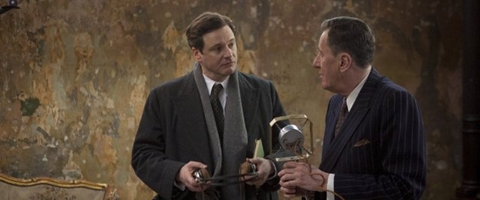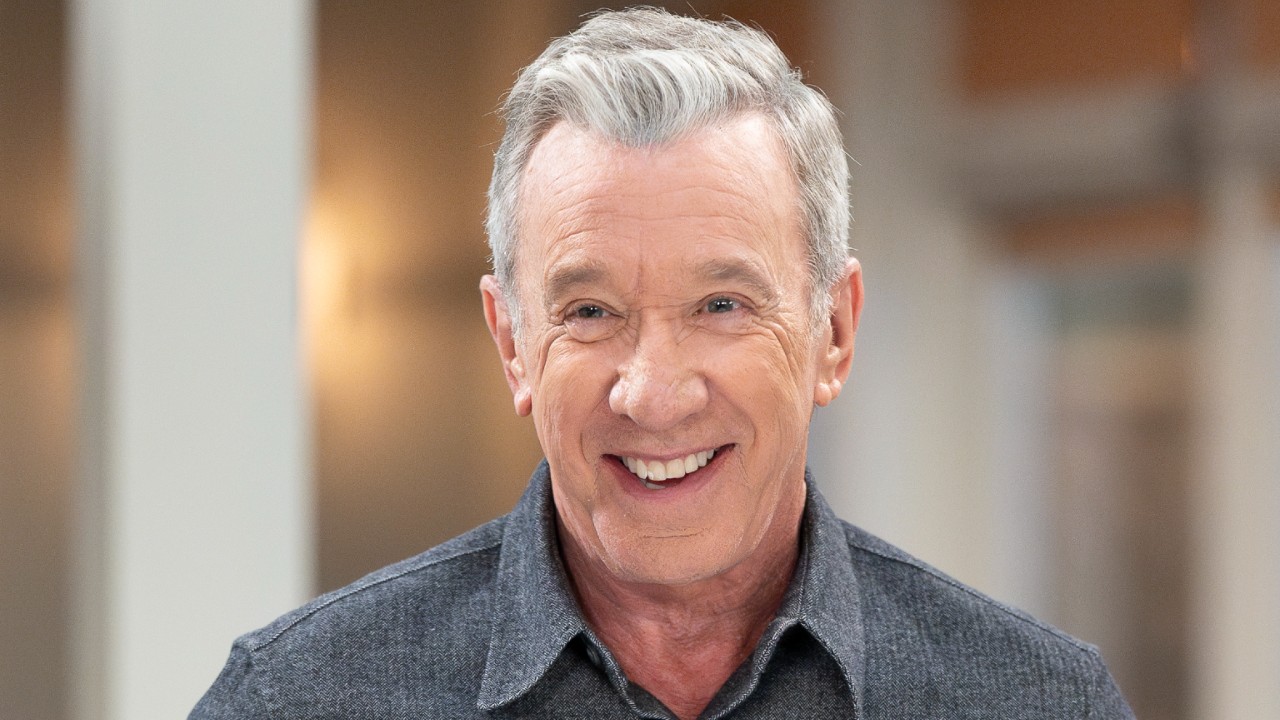The King’s Speech, the 2011 Oscar winner for Best Picture, is about a man learning to find his voice. It is also about a friendship, and an unconventional family. With all of these storylines, we might wonder if The King’s Speech could be a muddled mess. However, like the monarch the story is based on, The King’s Speech is a professional and handles all of the quirks and challenges in its story as such. The King’s Speech begins on a grey afternoon, as a man stammers to speak at a podium. It’s hard enough to see anyone stutter in front of a large crowd, but as cut-to shots of the listeners make apparent, this man is a member of the British aristocracy, second in line to the throne. To see him fail so miserably at his course of duty is not only a personal letdown, it is a cultural embarrassment, a hapless and incompetent public face for a nation already unsure of its place.
It’s not as if Bertie (Colin Firth), hasn’t been trying to receive help for his speech impediment. His wife, Elizabeth (Helena Bonham Carter), dutifully takes him to various doctors. In these meetings, Bertie is advised to smoke for confidence or forced to speak through marbles to achieve a stammer-less peace. None of this quackery works. Which would be fine; Bertie could live a rather unhappy but spirited existence with his bloody stammer, if only he weren’t being subjected to the bullshit of his unconventional family.
This mostly comes from Bertie’s elder brother, David (Guy Pierce), who is next in line to the throne. With a great war looming on the horizon, David cannot man up and behave like the ruler he was born to be. He’d rather go on adventures like a young boy, flying airplanes and making mistresses out of divorcees. His latest adventure is a woman named Wallis Simpson, played down rather unfortunately by Eve Best. With so many storylines, we never get to see how much of a pessimistic, self-enamored human Simpson really is. In The King’s Speech, she is only the catalyst to David/King Edward VIII handing the throne to his brother, now King George the VI.
A king with a stammer is in need of helpful friends. Elizabeth knows this, and hunts down Lionel Logue (Geoffrey Rush), a failed actor-turned-therapist who really has a knack for getting results. With Bertie’s introduction to Logue, work on his stammer might really commence. If only the two men could psychologically get on the same page. It doesn’t help that Logue insists on informality in his clinical work. It also doesn’t help that there is such apparent distinction between classes, especially where Logue, an Australian, is involved.
The King’s Speech doesn’t shy away from catering to what is black and white and easily recognizable. We are supposed to root for Elizabeth and shun Edward/David. In a lesser film, this would be because our characters lack depth. In The King’s Speech, director Tom Hooper chooses to portray his characters this way because it’s what is right. Edward shunned his entire kingdom in favor of what he believed to be personal gain, and Elizabeth went on to have some of the greatest approval ratings of a member of the royal family to date. Sometimes history works out in the audience’s favor.
Though its characters are deep but open books, the storyline in The King’s Speech achieves more grandiose depths. A small man would not have been capable of telling a story with multiple layers. The King’s Speech capably manages to be about the behavior of an aristocratic family, as well as a story about a person finding himself, and above all, a friendship. Generally, when such complicated lines are drawn, the stories remain separate, but that is not the case in this film. Tom Hooper not only mucks things up, he relishes the mucking, much like a child at play in the rain. It helps he has a seasoned cast and a nice little score to back him up. It helps that his story is fresh, even though it is set in a period that is widely dissected and well known. If anything, The King’s Speech is evidence that if a person struggles with an idea long enough, he or she can make old ideas feel new and new ideas feel timely. There aren’t a multitude of special features with the Blu-ray, but what they lack in quantity they make up for in quality. The first extra is a nice little featurette about the friendship between Lionel Logue and King George VI. Clips from the film are included, as well as brief interviews discussing the relationship between the two characters and how Colin Firth and Geoffrey Rush pulled them off. I only wish they had gone into a little more historical background on their relationship, if not in this segment, then elsewhere on the disc. This also isn’t an overly inclusive segment, but luckily a larger cast Q&A is included next.
The twenty-minute Q&A is hosted by Matt Holzman and features many members of the production, including Firth, Helena Bonham Carter, Guy Pierce, Tom Hooper, and Claire Blume, who plays Queen Mary. If you’re wanting quick answers to many of the main questions viewers might have concerning The King’s Speech, this is a good piece to watch. It's middling length also straddles that fine line between too long to watch and not enough information, so it’s perfectly pleasant to get through.
The disc also includes audio of several real speeches from King George VI, including the pre-war speech from September 3rd, 1939, made famous at the end of The King’s Speech. This segment proves Firth’s ability to get the vocal mechanisms of a stutterer right. Even if you don’t bother with the others, the September 3rd speech is absolutely worth a listen.
The final featurette is narrated by Lionel Logue’s grandson and is solely about the information producers of The King’s Speech were privy to after finding diaries regarding the relationship between Logue and King George VI. Unfortunately, Logue’s grandson never met Logue and never really seemed to understand Logue’s relationship with the king until he was much older. Still, having him speak about his grandfather is a touching way to make the man, the movie, and our experience with it slightly more personal. Too bad British history has sort of thrown Logue into the background and there wasn’t an historical expert on the man they could have consulted.
If you are left with any questions after all of these features, you can also set the disc onto audio commentary with Tom Hooper. Hooper never stops talking, and spends a lot of time mentioning historically accurate set details most audiences wouldn’t notice without having done research. If you are into detail, it’s a must-listen. Honestly though, the best part of the commentary for me was the slick way the disc goes into play mode straight from the audio commentary “on” button. Often you have to turn the commentary on, then return to the menu, and then finally hit the “play movie” again to achieve the results. This streamlined way to get there is much more effective and a nice end to a nice disc.
Tim Allen Pulled Home Improvement From His Own Experiences. One Way Shifting Gears’ Matt Parker Is Different
Hayden Christensen And Rosario Dwason Reunite During The Ahsoka Panel At Star Wars Celebration Japan 2025 - Live Blog
After Law And Order: Organized Crime Reunited Benson And Stabler, Dean Norris Credits Chris Meloni For 'The Most Unsexy Pickup Line You Can Imagine'











